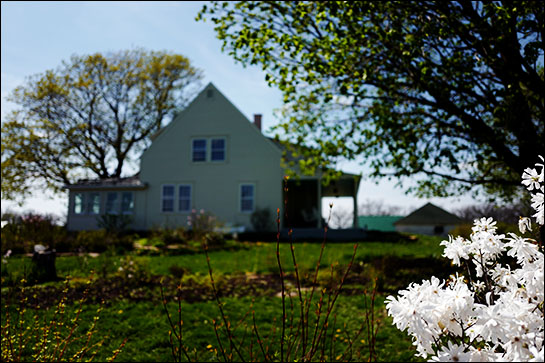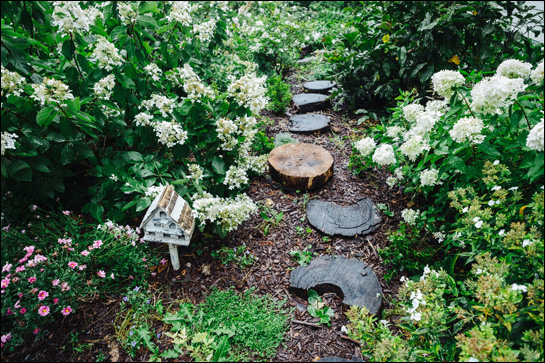Our happiness depends on the stories we tell ourselves

If you are a person who loves your garden, people send you pictures of your garden. It’s a way of saying thank you for making a nice place to enjoy. But since I am dense when it comes to social skills, I used to think people were stupid for sending me pictures of my own garden. I saw my garden every day.
Now I covet those pictures.
The pain I feel from missing my garden ripples through all of my life. I don’t want to eat the kale from the Co-op because I used to grow enough kale for ten families. I don’t want to walk through Swarthmore where there’s a hydrangea in every yard because I used to have twenty different types of hydrangeas, crafted perfectly along my winding paths.

The pain of the end is that you are so good at that thing. At that life you make. I remember when I stopped playing volleyball. It was so difficult to not go to the beach every day. It had been my job for eight years. I felt lost going to an office. I was a beach volleyball player. A beach volleyball player writing my novel. A beach volleyball player on a date.
Not playing volleyball never felt quite right until I had a baby. Then I felt so weird being a parent. Because it meant I was no longer a kid myself. I was more focused on losing that identity than I was on my newborn. Volleyball didn’t seem so important then. Lost identity is relative, I guess.
Volleyball ended like that.
My childless life ended like that.
And my garden ended abruptly as well. When I decide it’s time for change it happens quickly. I deal with the emotional trauma of it later.
So my garden is gone and I feel lost. Unfulfilled. It’s hard to see myself as only a mom. But there is no more of me that is not just a mom. I am becoming sort of an eccentric mom figure whose previously-full-feeling life is suffocating under the weight of her kids’ daily schedules. You know that type, for sure. It’s the mom you hate. The mom you never want to be. And never want to marry.
A big reason you hate that type of mom is she vents a lot. And people who express positive emotions are contagious. If all you see are good parts of life slipping out from under you, out of your control, that’s a narrative of endings. And it’s a narrative for unhappy people.
Instead, Heather Vough at University of Cincinnati finds that you should tell yourself you made a decision to do something else. Then you are a happy person in control of your life. Like, I traded volleyball for graduate school. I made that choice.
The narrative we tell ourselves matters. Cashing out. Having an epiphany. These are the narratives about endings that enhance one’s sense of self.
I’m trying to find a good narrative for my garden. Right now all I can think is that no one is taking care of it and it’s becoming a big mess. Or I am thinking the garden is beautiful and no one is enjoying it. No one is even noticing.
If you’re great at what you’re doing and then you stop, it’s almost like a breakup. You have to separate from your confident, capable self and go back to square one with your uncertain, bumbling beginner self. It’s hard. And people don’t enjoy doing it.
The silver lining of any ending is that I’m a master at navigating the five stages of grief.
So I’m telling myself I can go back after the kids grow up. Maybe that’s true. I don’t know. But this is easily identifiable as the bargaining stage, and if you can identify your stage of grief you can start to get a grip.
Getting a grip seems like an improvement. So maybe I should write about that instead, because people cope with endings much more easily if they write down positive aspects of their day at the end of each day.
The farmer just stopped paying for farm Internet. And he doesn’t do the phone. He’s never talked on the phone. So it’s unclear how much I will talk with him between now and ten years from now. And my garden will have gone to hell by then.
Maybe I’ll marry someone else who has a garden.
Maybe I’ll get smart enough about relationships to not marry people for their gardens.
Maybe I can tell myself the boys outgrew the garden and I did what any good mother would do. I helped my kids grow into the people they want to be. Maybe I am a gardener of children.
You can only write saccharine sentences about gardens of children if you follow it with one about snakes hiding in the peonies and eating just-born kittens in a gulp. It’s a writing rule for writers who don’t want to suck.
The last stage of loss – acceptance – is not about even about being settled, let alone happy. It’s about being numb. So I am going have to come up with some really great silver-lining type story about how not having my garden is great for me in order to drag myself out of my post-garden stupor.
Melissa’s way to offer compassion is to send me good links, and one was about how getting your heart rate up keeps you young. I can’t figure out how to tell a story of me and my garden that will make me happy. But in the meantime I’m running intervals each morning, because when I do finally figure out that story, I don’t want to be too old to jump for joy.

I think in life everything is attitude. If when you happen several bad things you are able to be aware of the situation, laugh, breathe deeply and think constructively everything is solved.
all already know that, even many people lie to himself about whe we are
It is really very nice post, that taught a lesson of self-motivation.
I have verified with myself that if you force yourself to smile every day and get rid of negative thoughts, in the end you end up doing it by inertia, and that is when happiness comes.
I don’t think the boy’sgift should dictate so much. It was disruptive enough when Penelope was driving 6 hours multiple times a week, now the boys have apparently lost their step dad. I see this as Penelope’s ego needing to be fed, it is probably way more fulfilling to be mother of a prodigy than a farm wife.
We lost everything in a span of 18 months. We made arrangements for our kids to live with friends so they could finish high school. We moved into a tiny apartment. We fought with the government for benefits. The paperwork was an avalanche. Then came the lawyers.